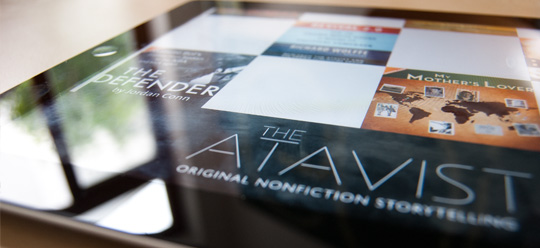Atavist is a New York media and software company at the forefront of digital, mobile publishing. Its mission is to enable the next generation of multimedia storytelling, reaching readers across mobile devices and the Web. Whether it’s in Atavists own stories or those of others who use Creatavist platform, the aim is to push the edge of the digital reading experience. The Atavist is digital-first, pushing the boundaries of multimedia publishing while always emphasizing the story above all.
Evan Ratliff is co-founder of Atavist, CEO and editor. He is an award-winning journalist for The New Yorker, Outside, National Geographic, and Wired, where he has been a contributing editor for a decade. His 2009 Wired story „Vanish“, about his attempt to disappear, and the public’s effort to find him, was a finalist for the National Magazine Award for feature writing.

There are so many stories out there, worth to be told. What are your reasons to pick one for The Atavist?
ER: We have a particular interest in long, narrative stories. There are of course a lot of outlets for all types of stories, particularly short news and opinion. But we are focused on pieces that actually read like a story, not an article—they are full of characters that encounter conflicts, twists that surprise the reader, and a certain depth of reporting and thought to them. We’re always looking to get past the news (and sometimes to even reach into the past to find lost stories worth reviving), both to provide more depth and context, and to entertain readers. So, for instance, we wouldn’t do a short piece on what’s happening with the war on drugs. But we would do a story about a drug cartel started by high school students in the 70s, and what became of them. We wouldn’t do a story just generally about immigration in America. But we would do one about the mysterious murder of an American immigration officer in Mexico. We wouldn’t publish a news story about hurricane Sandy but we would publish a minute-by-minute account of a legendary ship that sank during that storm.
Some people say that the printing industry is a dying business. What makes you sure that stories will survive online?
ER: Well, I probably don’t agree completely with the “print-is-dying” people, or really anyone who sits around pontificating about such things. But I’m confident that storytelling will survive because it’s an integral part of the human experience which has existed in one form or another throughout history. The fact that we increasingly turn to the Internet as the source of information and entertainment makes that a likely place where storytelling will move to. Indeed, it already has. The only real question is what form stories will take, and we happen to believe that with the right thought and design, long stories can survive as well or better online than they have in print.
Speaking of The Atavist as a business model – are there enough readers willing to pay for your content?
ER: Building up a paying readership takes a long time, and we’re still in the very early stages. Some of our stories pay for themselves, some don’t, and some pay well enough to cover some of the ones that don’t. We’re experimenting with all sorts of ways to capture readers, by selling directly to them, by offering ebooks and audiobooks, by developing subscription models. The hope is that over time we’re able to land on the most stable, sustainable model. In the short term we’re fortunate that we also develop software, which both lets us stay on the cutting edge and gives us income that provides the freedom to experiment.
Let’s have a dream: The Atavist 2020 and the state of Multimedia Storytelling?
ER: I’m terrible at predictions! I never would have predicted that we’d be here now.
© Interview by Strombuch.com | watch Evan Ratliff at XOXO Festival
 Strombuch
Strombuch